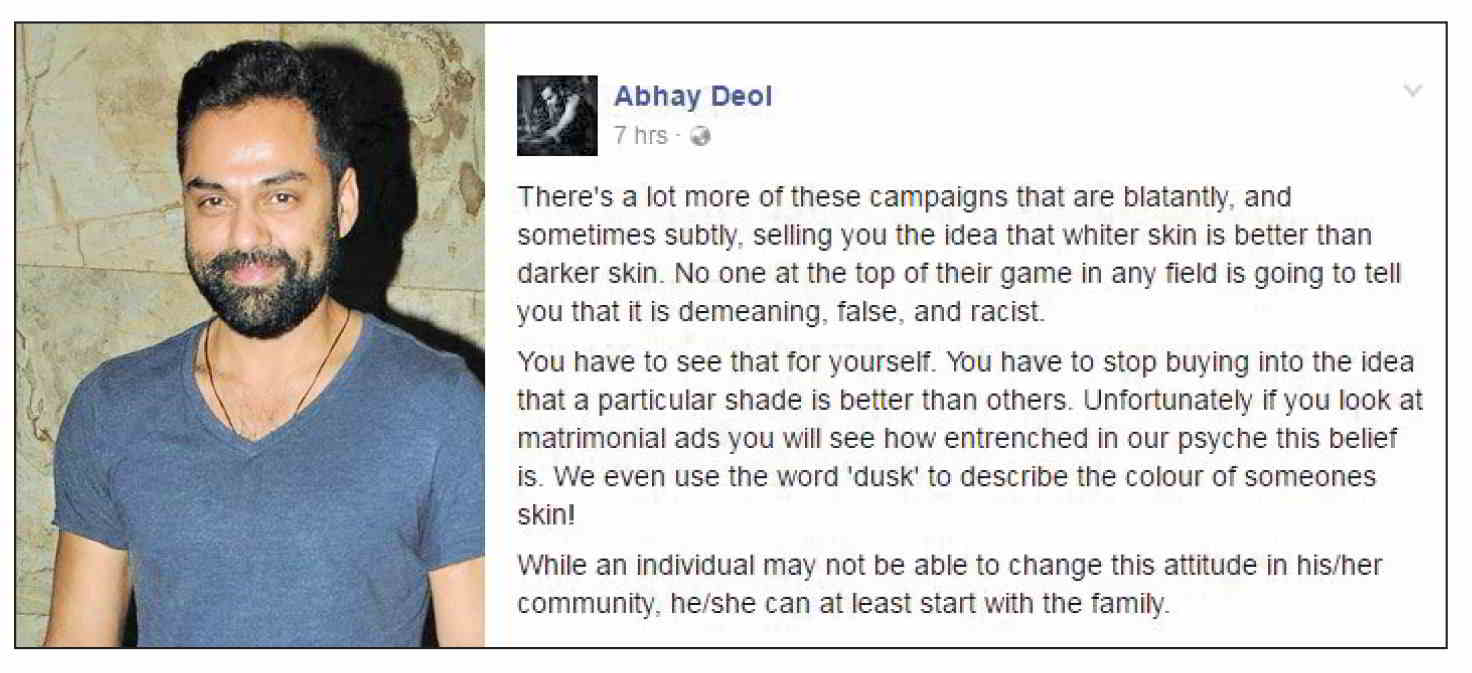Abhay Deol’s roast of Bollywood stars endorsing so-called fairness creams gives a new twist to an old controversy
~By Rakesh Bhatnagar
The debate over skin colour has taken on a different hue. Actor Abhay Deol taking on fellow Bollywood stars who endorse fairness creams may have given a boost to the tabloid press but it does not hide the deeper context—the white skin obsession of Indians that is a form of closet racism.
Deol’s charge comes shortly after this inherent social flaw was exposed in Noida, UP, where mobs turned viciously on African students. That tragedy was compounded by BJP spokesman Tarun Vijay who made the shocking statement that Indians cannot be racist because they co-exist with South Indians. While Deol may have a point in his criticism, the fact is that the biggest names in Indian cinema see no conflict of conscience in getting paid big bucks to promote a particular cream with debatable properties. In fact, some fairness cream brands have become household words. Back in March 2016, Congress vice president Rahul Gandhi, responding to the President’s address, mocked Prime Minister Narendra Modi’s scheme for converting black money into white after paying tax as a “fair and lovely” move.
Of the Rs 3,000 crore cosmetics and toiletries market, the skincare segment accounts for over Rs 1,200 crore
The Treasury benches may have reacted in anger but the fact remains that Rahul’s comment echoes a major concern that discrimination on the basis of skin colour has become a serious problem. Ironically enough, it is parliament which has failed in enacting laws either against endorsement of fairness creams and their claims, or against social discrimination on the basis of skin colour. Our newspaper matrimonial ads offer enough evidence of the Indian preference for fair skinned brides and grooms. In that same parliament, Janata Dal leader Sharad Yadav had brought up the access given to British film maker Leslee Udwin by Tihar Jail authorities for a documentary on the Nirbhaya case, alleging it was because of her fair skin.
Celebrity endorsements or not, of the Rs 3,000 crore cosmetics and toiletries market, the skincare segment accounts for over Rs 1,200 crore. Even without the advertisements, most Indians, men and women, believe that a fair skin is a distinct advantage in employment opportunities, promotion, marriage and status in society. As one of those Bollywood stars targeted by Deol, Kareena Kapoor, said in her defence: “It’s not like I am selling cigarettes or alcohol…if there’s a brand that thinks I’ll be right for it, then why not? And the market for that is huge—a lot of people are using it.”
The judiciary has taken some steps in coming down on discrimination. In one case, the Supreme Court upheld a judgement passed by the Madras High Court holding that taunting a wife on her “dark” complexion amounted to cruelty. The ruling held that taunting a woman for her ugly looks or dark complexion amounted to mental cruelty which is “worse than physical torture’’. The bench comprising Justices Altamas Kabir and JM Panchal confirmed the sentence imposed on the husband Farook Batcha who had constantly taunted his wife Fathima for her dark complexion. She committed suicide within two months of their marriage. She had left a dying declaration saying ‘‘since my complexion was dark, my husband does not like me and there are frequent quarrels between us”.
In 2016, a district consumer court in Delhi slapped a Rs 15 lakh fine on beauty and skincare major Emami for misleading consumers about its top-selling fairness cream brand for men, Fair and Handsome. The ruling came three years after Nikhil Jain, then a 23-year-old, filed an unfair trade practices suit against the company. Jain had been lured by advertisements for Fair and Handsome cream that promised users fairer skin in four weeks. When it failed to transform his complexion, he took the aid of his law student brother and filed a suit.
The court found that although Emami’s official position was that its product was meant to improve “skin health”, its advertisement—featuring Shah Rukh Khan—promised to deliver “gorapan”. It was a clear case of misrepresentation, the court ruled.
ASCI guidelines say that ads should not show people with darker skin as unattractive, unhappy or depressed
The Indian obsession with pale skin also means that the right to life with dignity as guaranteed by Article 21 has been ruthlessly violated. The Washington University Global Studies Law Review conducted a study in Indian colleges in 2015. When asked to describe “pretty”, 71 percent of the respondents included the words “fair” or “light” along with other attributes. “Therefore, it can be easily believed that most of the darker skin tone males as well as females aspire to a lighter skin tone than their own colour”, the report said.
Ironically, the guidelines issued by Advertising Standards Council of India (ASCI) have been blissfully ignored. The ASCI code says that advertisements should not deride race, caste, colour, creed or nationality. Another guideline says that advertising should not directly or implicitly show people with darker skin as unattractive, unhappy, depressed or concerned. “These ads should not portray people with darker skin, in a way which is widely seen as, at a disadvantage of any kind, or inferior, or unsuccessful in any aspect of life particularly in relation to being attractive to the opposite sex, matrimony, job placement, promotions and other prospects.”
That code means little to advertising agencies chasing a Rs 1,200 crore business. Or to the men and women in India who blindly believe their fortunes will change if they acquire a whiter shade of black.


